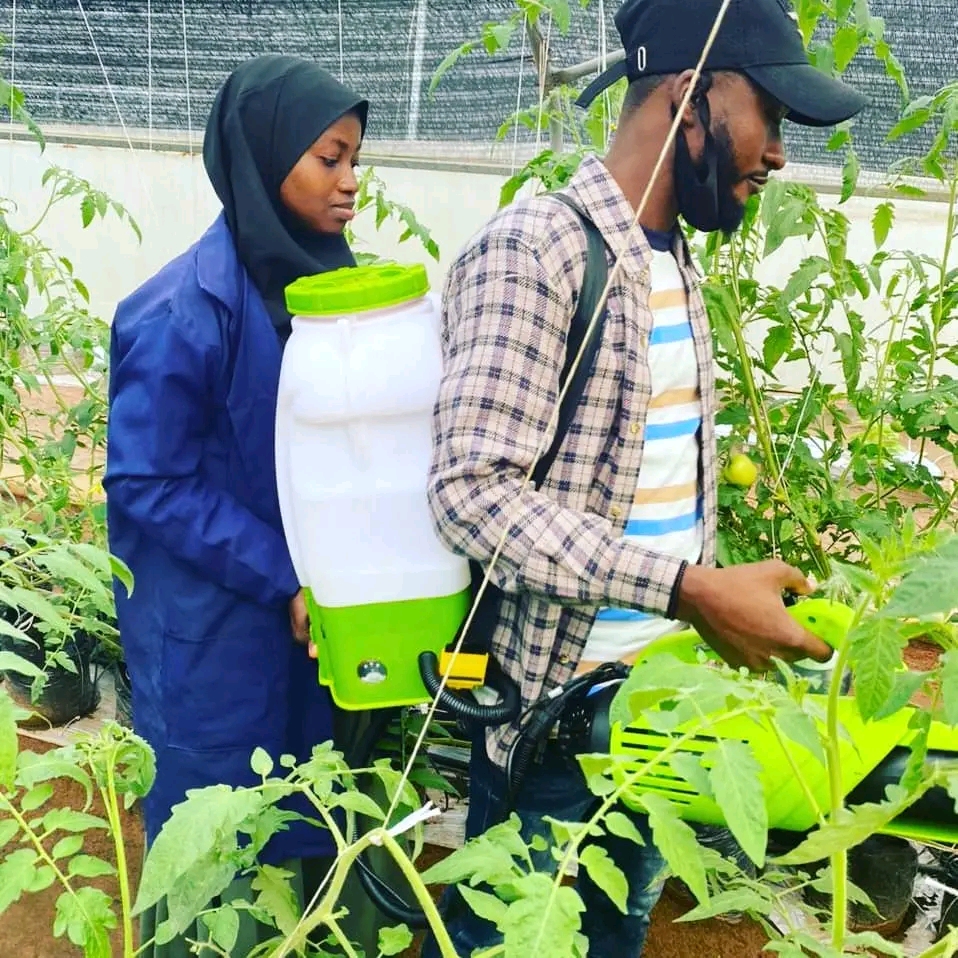Growing up in the torrid region of Nigeria’s Taraba State, Nathan El-nathan saw firsthand how a good number of households struggled to secure food each day.
He thought long and hard about a solution that would ameliorate their plight, but he later shelved the idea. Then in 2021, with the support of a team of young people, El-nathan founded Smartel Agro Limited in the Nigerian state of Plateau. As an agricultural startup, Smartel works to provide simulated soil for plant crops without the external influence of sunlight and rainfall.
“At Smartel Agro, we employ the use of smart and fast farming technology, such as artificial intelligence and smart hydroponic farming systems, to grow the crops,” El-nathan said.
Insights from studies indicate that climate change remains a constant threat to agricultural productivity in Nigeria as temperatures become more extreme. Though a graduate in geology, El-nathan’s curiosity led him to research creative solutions to improve farming systems in the country.
“I was just being inquisitive, I was just keen to find possible solutions. I carried out lots of research and that was how I came up with the idea,” El-nathan recounted.
To kick off the agroinitiative, Smartel carried out educational programmes within some communities in Jos, enlightening the locals on smart hydroponics works. Through an auto-soilless farm, smart hydroponics ensures that subsistence farmers can grow their crops all year round without needing soil or climate.
Usually the system is installed within the farmland and tailored to its specifications as provided by the farmer. While Smartel’s agro innovation promises fresh food crops without disrupting weather conditions, it comes at a huge cost for many farmers.
“It depends on the space you have and then how large or small you want it to be. So I can’t give you a specific amount of money that we charge for each construction, but it is very affordable since we use locally sourced materials to construct and then implement the solution,” El-nathan explained.

Beyond this, Smartel Agro Limited sells farm products grown from the smart hydroponics farming system to households across Nigeria. Since its inception, the smart hydroponics farming system has been sold to about 15 subsistence farmers, thereby boosting productivity for these farmers.
Mark Pwahuno, for example, believed there was no viable space for farmers in Jalingo until he was introduced to Smartel’s hydroponic system, which he installed in his backyard.
“This is a wonderful innovation. I believe that with proper awareness, people with an interest in farming will begin to adopt the system, just like I’m doing here. I grow fresh vegetables like pepper and tomatoes,” Pwahuno said.
There is also Laazonrang Hananiya, who is confident that the future of agriculture lies in smart farming.
“I believe this is something that can be sustainable, and the quality control of the crops grown with the system is also top-notch,” Hananiya told Prime Progress.
Like Pwahuno, Hananiya accrues some profit from the fresh pepper and tomatoes he grows on his farm.
Amid the wide reception, El-nathan is today moving towards adopting precision agriculture, which uses artificial intelligence to control the farm. El-nathan envisions a future where farmers can monitor their farms and crops remotely using a mobile application. “We are also planning to incorporate sensors into the system, so the application could detect issues and suggest solutions while promoting efficiency and early problem resolution,” the 26-year-old explained.
In addition, the mobile application will help to identify and monitor crop pests and diseases in plants, sending information to the user’s smartphone about the pest and suggesting a possible remedy.
“So this is the extent we have gone so far and then we are trying to see how we can make agriculture better. We will soon make it available to the public. The application is called Groyoveg,” El-nathan told Prime Progress.
Not many farmers within Jos have adapted Smartel’s innovative approach to bypass invariable climate conditions. This is because of the technical know-how that comes with using the smart hydroponic system. Smartel Agro bridges this gap with educational outreach, educating local farmers about the benefits of technology in agriculture amid an unstable climate in order to achieve sustainable food production.
Nathan El-nathan, growing up in Nigeria's Taraba State, witnessed food insecurity in households and sought solutions to alleviate it. In 2021, with a team, he founded Smartel Agro Limited in Plateau State, an agricultural startup aiming to provide simulated soil for crops independent of sunlight and rainfall using smart and fast farming technologies like artificial intelligence and hydroponics.
Climate change poses a significant threat to Nigeria's agricultural productivity, prompting El-nathan, a geology graduate, to explore innovative farming solutions. Through educational programs in Jos, Smartel introduced smart hydroponics to local farmers, enabling year-round crop growth without soil or climatic dependencies. The system, installed tailored to each farm's specifications, uses locally sourced materials to keep costs affordable.
Smartel Agro also sells produce from its hydroponic farms to households, enhancing productivity for about 15 farmers. For example, Mark Pwahuno successfully grows fresh vegetables in Jalingo using the system, and Laazonrang Hananiya benefits from sustainable and quality-controlled crop production.
El-nathan envisages expanding into precision agriculture with AI-controlled farms monitored via a mobile app, Groyoveg, designed to detect issues and provide solutions. The app will also help identify and manage crop pests and diseases. Despite initial reluctance due to the technical complexity, Smartel bridges the gap through education, striving for sustainable food production amid climate instability.






